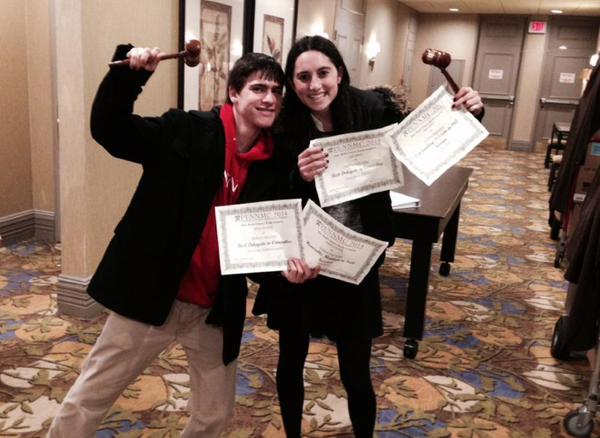In spite of fewer seniors and less debating time, 10 awards for Model Congress

GAVELS: Juniors Daniel Steinberg and Sigal Spitzer won two awards each.
June 1, 2014
Shalhevet’s Penn Model Congress team won 10 awards at the annual debate conference in Philadelphia, in spite of scheduling changes that increased the impact of Shabbat and in spite of there being fewer upper classmen on the team than last year or the year before.
Last year, Shalhevet won 14 awards at Penn, and in 2012 it won 18. Both of those years, there were 11 seniors on the team. This year there were only three.
Debaters from all over the U.S. compete at the Philadelphia contest, where students present bills for action by Congressional “committees” and are judged by their arguments on their own and others’ bills.
“Winning an award is a huge deal,” said junior Sigal Spitzer, who won a gavel – the highest possible award at the conference – and an Outstanding Delegate award. “Even though difficulties complicated the trip, we still made ourselves proud.”
Other winners included junior Daniel Steinberg and sophomore Jonah Gill, who both won a gavel and an Honorable Mention.
For her bill, Sigal advocated allowing women who pass certain tests to join elite Navy Seal, Army Ranger and combat units alongside men.
In his bill, Daniel Steinberg suggested implementing a voluntary program for the cyber-security of corporations. His committee approved it.
Most team members attributed the fewer awards to missing 50 percent of the conference; others thought an inexperienced team and lost practice time hurt more.
Debate Coach Mr. Chris Buckley agreed with all three reasons.
“I was relatively satisfied with our performance given all the factors working against us this year,” said Mr. Buckley. “I always feel that we could’ve done better.”
Due to Shabbat, the debaters missed 50 percent of the conference, which Mr. Buckley thinks affected how the judges viewed them.
In the past, the trip has taken place in February, before daylight savings time, meaning that Havdalah happened early enough for Shalhevet debaters to attend an entire session on Saturday night.
But this year the debaters came an hour late on Saturday night, so it was harder to get involved in the session.
“We lost more debate time than ever before,” said Mr. Buckley.
Experience was also a factor. Out of the 25 team members, seven were on their first debate conference, and five were freshmen.
In addition, this year for the first time, boys and girls stayed on separate floors of the Sheraton University City Hotel, and curfew was at 12:30 a.m. instead of 4 a.m.
That was because on the team’s Princeton Model Congress trip to Washington, D.C., last November, students were caught breaking curfew and wrestling with one another on beds. That prompted the administration to at first cancel the Penn trip altogether, but in January they decided to reinstate it if the students agreed to stricter rules.
“There was no more team bonding past the regular Model Congress curfew,” said a team member who asked to remain anonymous. “The trip became more work-centered, which might be why we ultimately did not do as well.”
Before the conference, the debate team spent a night in New York City so they could tour Yeshiva University and Stern College on Wed. March 26.
After a half- hour meeting with YU President Richard Joel, the team had the rest of the day to sightsee and spend time with friends and family.
“I really enjoyed seeing Stern,” said Junior Miriam Bern. “They have the largest women’s Beit Midrash in all of the United States.”













